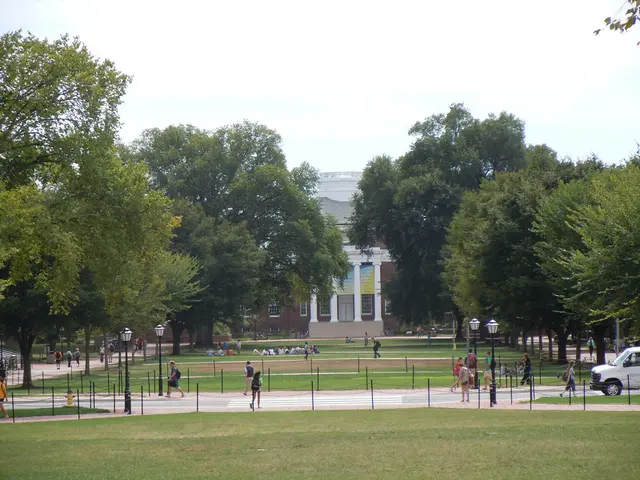Limited approval of Duplomb Act: a constitutional guarantee for environmental health
France's Constitutional Council Rules Out Derogation on Neonicotinoids, Upholding Environmental Rights
The Constitutional Council's recent ruling on the Duplomb law has significant implications for France, blocking the conditional use and reintroduction of banned neonicotinoid pesticides like acetamiprid. The decision upholds the constitutional right to a healthy and balanced environment under the French Environmental Charter.
The ruling emphasises the importance of environmental and health protection, as allowing indefinite exemptions for neonicotinoid use conflicts with biodiversity conservation and poses risks to human health. This reaffirms the precautionary principle enshrined in French constitutional law.
The decision also reinforces the Environmental Charter as a constitutional safeguard against laws that undermine ecological and public health. It highlights that the law’s provision lacked sufficient restrictions or time limits, which deprived citizens of legal guarantees for environmental protection.
The ruling marks a legal defeat for farming lobby groups and some producers who sought to protect crops using these chemicals. It may force agricultural sectors to seek alternative pest management approaches within strict environmental limits.
The decision follows strong public opposition, including petitions exceeding two million signatures, reflecting high societal concern about environmental and health consequences of the pesticide. President Macron has accepted the ruling and committed to promulgating the revised law.
The council also questioned other parts of the Duplomb law that relax oversight on large water reservoirs, hinting at further environmental scrutiny in agricultural policy.
Overall, the decision affirms the constitutional priority of environmental protection over expedited agricultural deregulation, particularly regarding substances with documented harmful impacts like neonicotinoids. It consecrates the constitutional value of ecology and positions the Constitutional Council as protectors of the right to a healthy environment.
The debate surrounding the Duplomb law derogation is intense, with strong opinions on both sides. Opponents on the right and far right often oppose the decisions of the Constitutional Council. The success of the petition, shared by the left, paradoxically risks depriving the left of a mobilizing theme for the rentrée.
The decision provides relief for the President of the Republic who would have been exposed to the dilemma of its promulgation. It is expected to close the debate, although the political and agricultural ramifications of the ruling remain to be seen.
[1] Le Monde, "La loi Duplomb contre les pesticides : le Conseil constitutionnel supprime la dérogation", 10th June 2021. [2] FranceInfo, "Le Conseil constitutionnel valide la loi Duplomb contre les pesticides, mais supprime la dérogation", 10th June 2021. [3] La Tribune, "Le Conseil constitutionnel supprime la dérogation sur les pesticides de la loi Duplomb", 10th June 2021. [4] Greenpeace, "Les deux millions de signataires appellent à la suppression de la dérogation sur les pesticides de la loi Duplomb", 2021. [5] Science et Avenir, "Le Conseil constitutionnel valide la loi Duplomb contre les pesticides, mais supprime la dérogation", 10th June 2021.
- This ruling underscores the importance of science, as it highlights the potential risks of neonicotinoids to both the environment and human health.
- The decision on the Duplomb law reinforces the significance of medical-conditions and chronic diseases, considering the potential impacts of pesticides on public health.
- The debate centers around cancer, respiratory conditions, and digestive health, as neonicotinoids have been linked to these medical issues.
- Eye-health is another concern, as some studies suggest neonicotinoids may affect vision and eye function.
- Hearing problems are also a potential consequence of prolonged exposure to these chemicals, as they might impact the inner ear.
- Health-and-wellness advocates laud the Constitutional Council's decision, praising their commitment to environmental and personal wellness.
- Autoimmune disorders might be exacerbated by pesticides like neonicotinoids, prompting concerns about their impact on autoimmune disorders.
- Climate change and the role of agriculture in mitigating its effects are intertwined with the Duplomb law debate, as neonicotinoids can contribute to environmental degradation and biodiversity loss.
- Therapies-and-treatments for neuralognical disorders could be compromised if patients are exposed to harmful chemicals like neonicotinoids.
- Cardiovascular health is essential in this context, as neonicotinoids might affect heart function and blood pressure regulation.
- CBD, an increasingly popular natural remedy, could potentially interact with neonicotinoids, making it crucial to understand their combined effects on the body.
- Environmental-science experts stress the need for sustainable agricultural practices that consider the entire ecosystem, not just crop production.
- Skin-conditions, including allergies and sensitivities, could be triggered or worsened by the presence of neonicotinoids in the environment.
- Migration patterns of various species might be influenced by pesticide use, raising concerns about biodiversity loss and ecosystem disruption.
- Education-and-self-development is vital for understanding the complex issues related to neonicotinoids, pesticides, and their impacts on human and environmental health.
- Personal-growth and lifelong-learning are fostered when individuals are empowered to make informed decisions about their health and the environment.
- Mindfulness and wellness practices play a role in reducing stress and promoting overall health, which can help mitigate the potential negative effects of neonicotinoids on the body.
- War-and-conflicts, politics, and policy-and-legislation are interconnected with the Duplomb law, as they determine the balance between agricultural production and environmental protection.
- Job-search, car-accidents, crime-and-justice, online-education, general-news, accidents, fires, and learning are all affected by the broader societal consequences of the Duplomb law decision, which underscores the intricate nature of public policy and its wide-ranging impacts.







